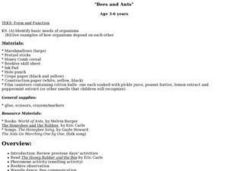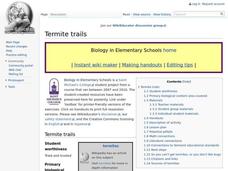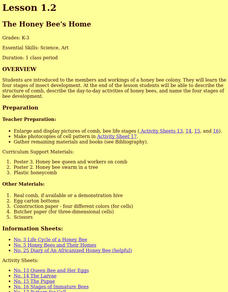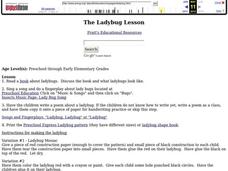Curated OER
Cricket Dissection
Students conduct an experiment to test the effects of various chemicals on breathing and to practice animal dissection. They carefully dissect house crickets to identify the breathing structures and determine their rate of respiration....
Curated OER
Are You One of Us?
Students investigate how scientists sort and classify organisms. In this sorting and classifying lesson, students examine what systematics are as tools that scientists use. They examine images of invertebrates and sort them while stating...
Curated OER
Arthropod Mouth Parts and Food
Students identify the different types of mouths arthropods have for eating various types of food. Given photographs of the different types of arthropods, students identify which mouth they have and what type of food they can eat with...
Curated OER
Using Descriptive Language - Inventing Your Own Bug!
Young scholars use descriptive language to invent and describe a bug. In this descriptive language lesson plan, students watch a video about bugs and review the names of insects. Young scholars complete a worksheet about insects and then...
Curated OER
"Bees and Ants"
First graders participate in a variety of activities related to bees and ants.
Curated OER
Spiders! Scary or Nice?
Students participate in a variety of cross-curriculur activities in order to explore spiders.
Curated OER
Using the Simple Present Verb Tense- Animal Activities
In this verb tense instructional activity, students complete 8 sentences using one of three choices that describe animal activities that use the simple present verb tense. They choose from activities that bees, rabbits, horses, mice, and...
Curated OER
Termite Trails
Students observe termite trail-following behavior. In this termite trails instructional activity, students draw a circle or other shape approximately eight inches across with a ball point pen. Teacher taps out termites into the circle...
Curated OER
Bee Story
Students consider the implications of the disappearing bee population. In this bee lesson, students read several new stories regarding the bee population and respond to the provided discussion questions.
Curated OER
The Honey Bee's Home
Young scholars are introduced to the members and workings of a honey bee colony. They describe the structure of a comb, the day-to-day activities of honey bees, and name the four stages of bee development. They construct a honeycomb model.
Curated OER
What Are Ecosystems?
Third graders recognize and examine ecosystems. They observe and describe habitats within ecosystems and observe and identify organisms with similar needs that compete for resources.
Curated OER
Be on the Lookout!
Students create "Wanted" posters for destructive bugs. They practice research skills as they learn about the characteristics, diets, habitats, and habits of a variety of bugs.
Curated OER
The Grouchy Ladybug By Eric Carle
Second graders complete a unit about ladybugs based on Eric Carle's, The Grouchy Ladybug. They complete comprehension questions, categorization activities, Venn diagrams, and choral readings of Susan M. Paprocki', Little Red Bug. As they...
Curated OER
Ladybug Crossword
In this ladybug crossword puzzle worksheet young scholars read 10 clues pertaining to ladybugs. Students place their answers in this puzzle.
Curated OER
Comparing Minibeasts
In this "Comparing Minibeasts Data Worksheet", learners respond to four short answer, one drawing, and eight graphic organizer questions.
Curated OER
The Ladybug Lesson
Students explore the traits of ladybugs. In this ladybug lesson, students read books, sing songs, and learn fingerplays about ladybugs. Students also create their own ladybugs.
Curated OER
What's A Mammal?
Learners examine mammals understanding what a mammal is and reviewing the eleven mammal groups. In this science lesson, students play a game known as Mystery Mammal Game. Yet, first learners research about the mammal and then give...
Curated OER
Ugly? Says Who?
Students explore biology by writing animal poetry in class. In this animal characteristics lesson, students research the Internet for facts about an "ugly" animal such as a bug or small critter. Students complete worksheets about animal...
Curated OER
Life Beyond the Fifty Yard Line -- An ecological look at our backyard
Students, in groups, stake out and rope off their study area, do population counts and density studies. They construct a map of the whole area, collect plants and insects, and mount and identify the organisms using keys.
Curated OER
Little Me in a Big World: Ants
First graders predict, observe and record strategies to overcome them using discussions, role play, and charts. Over a three or four day period, they examine obstacles that humans and insects encounter.
Curated OER
Animal Inventions
Students name the characteristics of animal groups. Students classify the major animal groups such as: mammals, birds, reptiles, amphibians, fish, and insects. They identify the elements of specific habitats that each animal needs in...
Curated OER
Science: Finlay and Yellow Fever
Ninth graders research the work of Carlos J. Finlay and his contributions to science. Once they have discussed his theories about diseases, they create tables comparing diseases that use insects as carriers. The lesson also includes a...
Curated OER
Arthropod Worksheet
In this arthropod instructional activity, students answer 4 questions about arthropod. For example, "Match the name of each class with the correct drawing" and "Draw a circle around any insects."
Curated OER
Butterfly Report
In this biology worksheet, students write an insect report about the butterfly, giving its common and scientific name. Then they describe the butterfly habitats and winter plans. Students also describe three interesting facts about the...
Other popular searches
- Insects Science
- Bugs and Insects
- Insects Word Search
- Esl Social Studies Insects
- Beneficial Insects
- Insects Basic Needs
- Insects Crossword
- Rain Forest Insects
- Arachnids and Insects
- Insects Butterflies
- Insects Math
- Dewey Insects

























